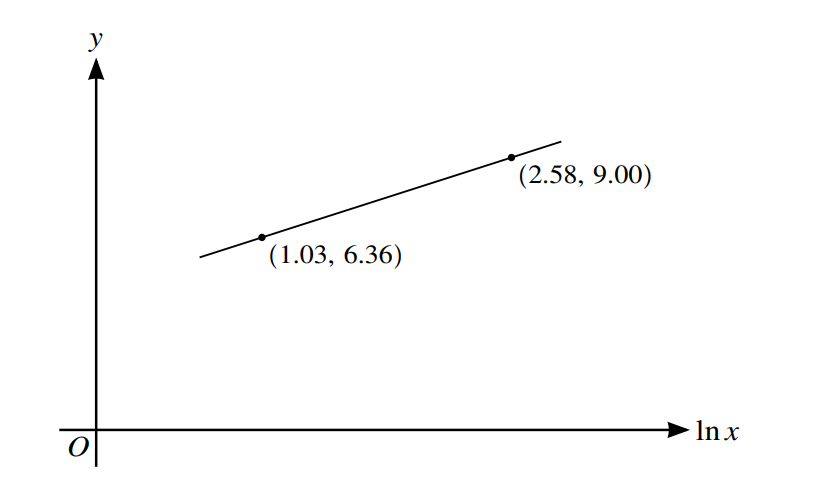Question
Given that
ln (2x + 1) − ln (x − 3) = 2,
find x in terms of e. [4]
Answer/Explanation
Ans
Use correct logarithm property to simplify left-hand side
Use correct process to obtain equation without logarithms
Obtain \(\frac{2x+1}{x-3}=e^{2}\)
Obtain \(x=\frac{3e^{2}+1}{e^{2-2}}\)
Question

The variables x and y satisfy the equation ay = kx, where a and k are constants. The graph of y against ln x is a straight line passing through the points (1.03, 6.36) and (2.58, 9.00), as shown in the diagram.
Find the values of a and k, giving each value correct to 2 significant figures.
Answer/Explanation
Ans:
State or imply equation is y ln a = ln k + ln x
Equate gradient of line to \(\frac{1}{ln a}\)
Obtain \(\frac{1}{ln a}\) = \(\frac{2.64}{1.55}\) or equivalent and hence a =1.8
Substitute appropriate values to find ln k
Obtain ln 2.7… k = and hence k =15
Question
A curve has equation y = 7 + 4 ln (2x + 5)
Find the equation of the tangent to the curve at the point (-2, 7), giving your answer in the form y = mx + c.
Answer/Explanation
Ans:
Differentiate to obtain form \(\frac{k}{2x+5}\)
Obtain correct \(\frac{8}{2x+5}\)
Substitute x = − 2 to obtain gradient 8
Attempt equation of tangent through ((-2, 7) with numerical gradient
Obtain y= 8x + 23
Question
The polynomial p(x )is defined by \(p(x)=ax^{3}+ax^{2}-15x-18\), where a is a constant. It is given that(x − 2 )is a factor of p(x).
(i) Find the value of a.
(ii) Using this value of a, factorise p(x )completely.
(iii) Hence solve the equation \(p(e\sqrt{y})=0,\) giving the answer correct to 2 significant figures.
Answer/Explanation
[2]
4(i) Substitute x = 2 , equate to zero and attempt solution
Obtain a = 4
4(ii) Divide by x − 2 at least as far as the x term
Obtain\( 4x^{2}+12x+9\)
Conclude\( (x-2 (2x+3)^{2}\)
4(iii) Attempt correct process to solve \(e^{\sqrt{y}} \)= k where k >0
Obtain 0.48 and no others
